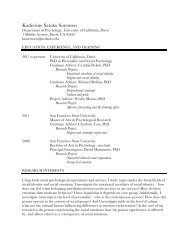The Psychology of Creativity:
The Psychology of Creativity:
The Psychology of Creativity:
Create successful ePaper yourself
Turn your PDF publications into a flip-book with our unique Google optimized e-Paper software.
History <strong>of</strong> <strong>Creativity</strong> Research 5<br />
essence <strong>of</strong> genius, I will venture to assert, that assiduity unabated by difficulty, and a disposition eagerly<br />
directed to the object <strong>of</strong> its pursuit, will produce effects similar to those which some call the result <strong>of</strong><br />
natural powers. (p. 37)<br />
If creative genius can be acquired simply through disciplined training and practice, then creativity does not seem to<br />
represent a phenomenon to be explained. This situation was to change in the 19th century.<br />
<strong>The</strong> Nineteenth Century<br />
<strong>The</strong> most obvious prerequisite for the psychological analysis <strong>of</strong> creativity the arrival <strong>of</strong> psychology as a<br />
bona fide scientific discipline. But this event is necessary, not sufficient. Other circumstances are required if<br />
psychological science is to direct its attention to the phenomenon <strong>of</strong> creativity. Three major movements may be<br />
credited for pushing psychology in that direction: the advent <strong>of</strong> Darwin’s theory <strong>of</strong> evolution, the emergence <strong>of</strong><br />
statistical methods, and the establishment <strong>of</strong> clinical science.<br />
Evolutionary <strong>The</strong>ory<br />
I have implied the psychological research on creativity cannot exist until creativity is first recognized as a<br />
natural phenomenon that needs explanation. If creativity is a gift from the gods, or if it merely a technique to<br />
learned and applied, then nothing remains to be explained, at least not scientifically. This situation had an analogue<br />
in pre-evolutionary views <strong>of</strong> life. If all the life forms on this planet were truly placed here by a divine Creator as<br />
described in the Book <strong>of</strong> Genesis, then scientists also have nothing to explain. Instead, scientists are confined to<br />
describing God’s work, as in Buffon’s Natural History, and classifying its diverse life forms, as in the Linnaean<br />
taxonomic system. To be sure, scientists eventually appeared who would <strong>of</strong>fer theories <strong>of</strong> biological evolution,<br />
Erasmus Darwin and Lamarck perhaps the most notable among them. Yet none <strong>of</strong> these individuals managed to<br />
shake the deep faith in the Creationist account.<br />
Charles Darwin’s 1859 Origin <strong>of</strong> Species changed all that. Inspired by his experiences in the Beagle<br />
voyage, and especially by his encounters with the life that had evolved on the Galapagos Islands, Darwin firmly<br />
believed that a genuine phenomenon that required scientific explanation (Darwin, 1860/1952). <strong>The</strong> biblical account<br />
just would not do. Furthermore, Darwin proposed a purely naturalistic explanatory system, the theory <strong>of</strong> natural<br />
selection. Recognizing that each species spontaneously generates variation that that these variants differ in their<br />
adaptiveness to a given environment, new species could emerge by the survival <strong>of</strong> the fittest variants. Not only was<br />
a divine being left out <strong>of</strong> the picture, but also the process had no direction or purpose, no grand plan or ultimate goal.
















